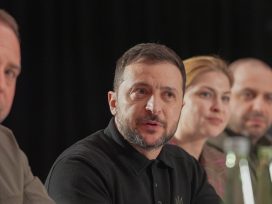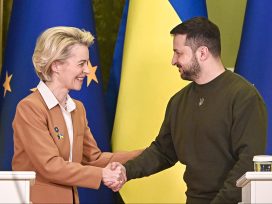Bad peace vs. good war
Ukrainian democracy might be highly chaotic and immature – but at least it’s a democracy. Nevertheless, there’s still a lot to do before the country achieves anything like stability – namely, a thoroughgoing reform of the post-Soviet institutions, beginning with the judiciary.
It was a cross between patriotic drama and family vaudeville. In the early hours of Whitsun, at approximately 3 a.m., Ukraine’s top leaders – the President, the Prime Minister, and the Head of Parliament – appeared before the journalists who had been keeping vigil at the nearby presidential headquarters. They had, they announced, reached a compromise over the pending political crisis. The peaceful solution would be to go ahead with the early parliamentary elections on 30 September. Apparently, the Holy Trinity had enlightened the Ukrainian trio and helped them avert the catastrophe they themselves had set up.
It seems to have become a Ukrainian tradition to settle the trickiest political issues by midnight or, as was the case with the passing of the new constitution in 1996, by dawn. Since the Middle Ages, this method of reaching a compromise has been practiced by the cardinals who elect the Pope. But while it’s nothing new for Europe, it’s a novelty for the post-Soviet world, where bullets present a more pressing political argument than ballots.
Since Ukrainian independence in 1991, the international media has never been short of gloomy predictions about the country’s future. Some pundits envisioned Ukraine’s absorption by Russia, others augured a civil war and an inevitable division between the “nationalist west” and the “pro-Russian east”. Yet others prognosticated the secession of the Crimea and other regions and, again, civil war and Russian intervention, a.k.a. brotherly help. But the Crimea has not become another Chechnya, the disobedient parliament has not been quelled by tanks, and, year after year, opinion surveys have failed to detect any substantial support for separatism (with some exception for the Crimea, though even here the majority of respondents oppose any radical steps).
Indeed, there has been a lot of tension throughout the country over the last decade and a half. Sometimes, it has looked as though Ukraine was on the brink of bloodshed, as was the case in the first week of the Orange Revolution in 2004. But every time, the post-Soviet politicians, however dull, mediocre, and probably egoistic, had sat down with their rivals-cum-enemies and made a deal that could not fully satisfy anybody. But this is what democracy is about.
One might speculate why Ukrainian politicians behave so differently from their post-Soviet brethren elsewhere. It might be the different political culture that Ukraine absorbed long ago, in a pre-Soviet era, when it was part of the Habsburg Empire and Polish-Lithuanian Commonwealth. It might be also a peculiarity of the national character, expressed in the popular joke: “It’s the Russians who fight till the last drop of blood, we Ukrainians fight till the first drop.” But most likely, it is a matter of politics and economy per se. Ukrainian oligarchs, both “orange” and “blue”, would lose too much if political instability were to incapacitate the economy. And they may lose even more if they apply for violence and get easily predictable international retribution.
So far, they play a juvenile game of “who blinks first”. And this is exactly how the majority of Ukrainians perceive the infighting – in striking contrast to international media, which, by and large, takes politicians’ threats about a “creeping coup” and “state treason” at face value. Since 2 April, when Viktor Yushchenko announced his controversial decree on the dissolution of parliament and on holding early parliamentary elections, Ukrainians have carefully followed the escalating conflict between the branches of power. But their interest in most cases had more in kin with watching another soap opera than with profound personal engagement in the events, as was the case during the spectacular Orange Revolution.
Whatever the politicians say about the “crisis”, the “coup”, and “treason”, the national economy grows nearly one per cent every month, average income has tripled within the past few years, and media are free enough to expose the stupidity, greed, and corruption of all parties involved.
And this is where the good news for Ukraine ends and the bad news begins. Because the flipside of scepticism and soberness about politics is disenchantment and cynicism. It might be difficult, perhaps impossible, to mobilize the electorate for bad things like a civil war, but it’s also difficult to mobilize it for good things such democracy and civil society. The public clearly opts for a bad peace over good war, but the prospect of good peace is simply not on the agenda.
And a good peace in this case means a profound reform of the state institutions, primarily the judiciary, that Ukraine inherited from the Soviet Union. While these have been slightly modified, partly re-staffed, and sometimes renamed, they have not been adjusted to the needs of the democratic system and rule of law. The crisis in Ukraine comes from the dysfunctionality of the Soviet-style institutions, which always played a decorative, subsidiary role alongside the Communist party. As this centre of gravity and driving force behind the Soviet system disappeared, institutional shortcomings became just too obvious.
By the mid-1990s, president Leonid Kuchma had once again made state institutions manageable. However he achieved this not by reforming them according to democratic rules and procedures. He merely substituted the Communist party with another mechanism of control and informal manipulation. Kuchma created a “blackmail state” – a sophisticated system of dominance based on collecting “kompromat” (compromising materials) on everybody, together with selective application of justice against disloyal subjects. It was not the KGB but the tax police that became this system’s main enforcer.
Orange leaders did away with the system but did not create a new one. The dysfunctionality of Soviet-style institutions once again came to the fore, threatening Ukraine’s fledgling democracy. In the absence of comprehensive reforms, the institutional void had to be filled; the neo-Soviet, authoritarian Party of the Regions, led by Viktor Yanukovych, was naturally returned to office after the 2006 parliamentary elections. Now, however, it had to share the power with the President. The latter was not fond of the blackmail state and adamantly resisted Yanukovych’s attempts to monopolize power and re-establish Kuchma’s mechanisms of state dominance.
Crisis became inevitable. On one hand, Ukraine had achieved a sort of democracy through sharing of power. On the other, it proved to be a “democracy by default”, with no efficient institutions (above all a judiciary) that could have ensured the division of power in terms of proper procedures, limits, and conflict resolutions.
Hence, the latest political compromise achieved by the rival Ukrainian leaders would only have been meaningful had it entailed comprehensive institutional reforms, primarily legal, that would render the democratic system functional regardless of who is in power and who is in opposition. Failing this, Ukraine will lurch from crisis to crisis – until the political class understands that nobody will ever gain complete power in the country, and therefore that the best way to avoid the repeated stand-offs and dead-locks is to establish firm rules of power sharing, transferral, and supervision.
Published 1 June 2007
Original in English
© Mykola Riabchuk Eurozine
PDF/PRINTNewsletter
Subscribe to know what’s worth thinking about.



